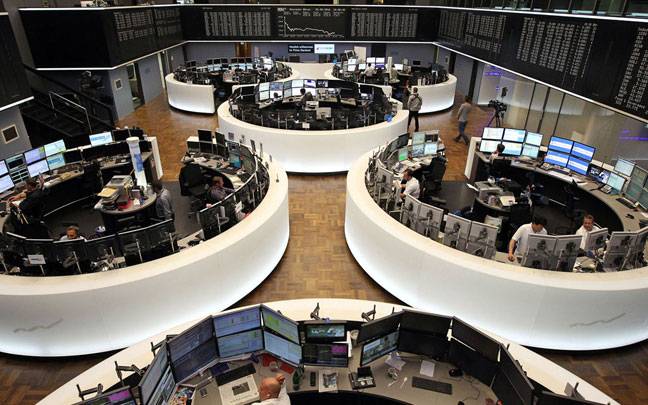LONDON - Stock markets mostly advanced Thursday as investors got a grip on their lingering fears of a deepening trade war between the US and China, dealers said.
Key European markets were well in positive territory by the mid-afternoon, although London was held back by a strong pound, and Wall Street also rose at the opening bell.
"US stocks are higher in early action, with global trade uneasiness remaining contained," said analysts at the Charles Schwb brokerage. But market resilience may well be short-lived, analysts warned, with Joshua Mahony at IG detecting a "hesitant tone" on trading floors. "The fears over US-China trade are likely to persist for some time yet," he said.
Emerging market currencies held their own after Beijing's pledge not to weaponise the yuan in its trade standoff with the United States.
Markets have been on the rise this week after the latest tit-for-tat tariffs from China and the US were considered lenient and allowed for talks, with observers suggesting a further escalation is unlikely in the near term. And while China on Wednesday hit back at US President Donald Trump's accusation that it is using the trade conflict to affect November's key mid-term elections, the generally upbeat sentiment continued in Asia and Europe on Thursday. Emerging market (EM) currencies enjoyed some much-needed buying support, having been beaten down by trade war fears in recent months, as well as concerns of a spillover from crises in Argentina, South Africa and Turkey.
Analysts said that as well as the easing trade tensions, a key boost for the currencies was Premier Li Keqiang's statement that China would not devalue the yuan to fend off the effects of any tariffs.
"China will never rely on the depreciation of the renminbi (yuan) to stimulate exports, because a one-way depreciation of the renminbi exchange rate will have more disadvantages than advantages," he told an economic forum.
"The premier's comments are encouraging as they indicate that China won't actively use its currency as a weapon in its trade scuffle with the US," said Rodrigo Catril, senior forex strategist at National Australia Bank.
However, he added: "As we have seen in recent months this doesn't necessarily mean that China will prevent the yuan from weakening if market forces push the currency lower."
Back in Europe meanwhile, the Organisation for Economic Cooperation and Development warned that ongoing trade tensions were likely to slow down global economic expansion.
Cutting its forecast for global growth, the OECD said that "a further rise in trade tensions would have significant adverse effects on global investment, jobs and living standards".






